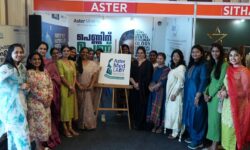KOCHI:
The Kochi Biennale Foundation (KBF) is convening a two-day international meet next week to look at the systemic shifts in global art education and explore ways of updating the subject in India as primary spaces of learning and knowledge production.
The KBF’s third Students’ Biennale Education Conference organised in association with Foundation for Indian Contemporary Art (FICA) will have scholars and experts from across the world speaking on matters such as learner-centric pedagogy, technologies of teaching, new materialism and significance of locations/sites in artistic practices.
Titled ‘Pedagogical In-Flux and the Art of Education’, the March 21-22 event amid the Kochi-Muziris Biennale (KMB) features panel discussions on subjects like the potential of localised forms of learning and technologies of arts and material reality within contemporary practice. The sessions aim to provide an overview of the Students’ Biennale Education platforms at art college students across India, address questions about the present state of education and allow formation of frameworks in teaching.
The speakers include Mumbai-based teacher Kausik Mukhopadhayay known for his artwork from discarded household objects, art historian Santhosh Sadanandan of Ambedkar University Delhi, South African artist Rangoato Hlasane who teaches at the University of the Witwatersrand in Johannesburg, Sri Lankan artist-educator Sanathanan Thamotharampillai, Kate Daw who heads the Victorian College of the Arts in Melbourne and artist-educator-researcher Mick Wilson of the Valand Academy under Gothenburg University in Sweden. Others to address the sessions are art historian Sarada Natarajan, artist-consultant David Sequeira, researcher-educator Nicole Marroquin, visual arts professional Bhooma Padmanabhan, artist-educator B V Suresh, KMB 2018 curator Anita Dube, KBF founder-president Bose Krishnamachari and Students’ Biennale curators Shukla Sawant, Sanchayan Ghosh and Krishnapriya C P.
The Students’ Biennale (SB), as an educational initiative that reaches out to art colleges across South Asia in a bid to encourage youngsters reflect on their practice and give them international platform, is being organised in association with two non-profit organisations: FICA and Foundation for Indian Art and Education.
The KBF’s Bose notes that the conference comes as a follow-up to the foundation’s recent series of workshops under the Students Biennale Expanded Education Programme. “Schools are very crucial. They considered the first point of entry in our re-thinking,” he points out. The Students’ Biennale workshops saw the emergence of some recurring fields/realms of investigation, with “each feeding into our understanding of how art practice can be taught with renewed rigour”.
Art educator Vidya Shivadas of the Delhi-based FICA notes it is time to re-excavate and expand the potential of art schools as ‘laboratories for thinking’ by diversification and intensification of learning environments. “What you need is a learner-centric approach that cultivates and nurtures the possibilities of coexistence of multiple frameworks for conception, production and transmission of artistic knowledge,” says Vidya, who is a speaker at the SB conference. “That may provide a way beyond the dichotomous structure of the ‘old’ and the ‘new’.”
The ongoing SB, coinciding with the fourth edition of the Kochi-Muziris Biennale being organised by the KBF, has students from the SAARC countries as well presenting their works. Bose recalls that the biennale has, since its start in 2012, focused on art education, thereby succeeded in reaching out to a number of educational institutions. “We got numerous entries for this edition of the SB,” he adds. “Most of the works in that segment are on par with what you see at contemporary arts festivals around the world.”




